Table of Contents
ToggleIntroduction
Excavators are crucial pieces of equipment for any type of construction. For example mining projects or buildings. These are made for heavy-duty hauling and digging in construction projects. Excavators not only boost your team’s productivity and efficiency but also lower operating costs. There are many types of excavators and these vary in size.
Excavators are used for a variety of industrial and contractor needs. These are mostly used in digging trenches, crushing pavement, breaking ground, lifting heavy materials, mining, road construction, demolitions, building constructions, and much more.
Smaller excavators handle digging and drilling functions however large excavators have many different tools for heavy-duty construction projects. These come in different varieties according to project needs.
If you want to buy or rent an excavator you will consider its size, speed, and working condition on the construction site. Some of the working conditions are given below
✔Space available on the job site
✔Types of soil on construction site
✔Type of land for example is it steeply land, barren; etc.
An excavator that is right for you will provide strength and ample power to meet the project demand while operating at the highest efficiency.
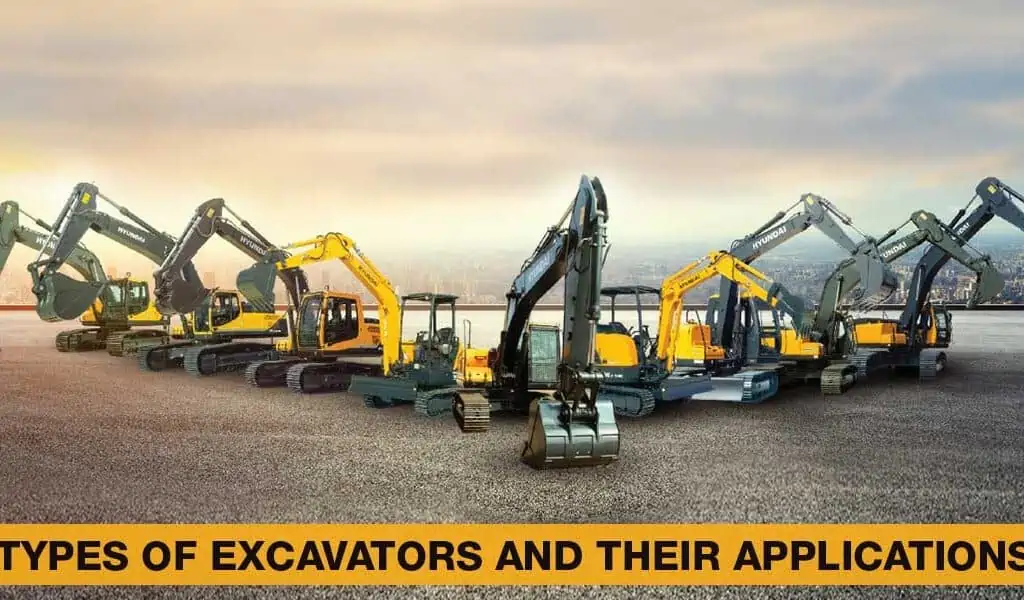
What Are Some Most Common Types Of Excavators Used For Multiple Projects?
Mini Excavators
Mini excavators are lighter and smaller in size than that traditional excavators. A mini excavator consists of a dipper, boom, or stick and a bucket that is connected to the cab. The cab is situated in the rotating house. The rotating house can rotate 360 degrees fully. This kind of excavator can have wheels or even tracks in its undercarriage.
Mini excavator weight less than 4535 kg which is equivalent to 9,999 lbs. A small mini excavator can fit between doorways. The bucket size of mini excavators can vary from 12 to 24 inches. The bucket can be replaced with any other attachments according to the demand of the project. Mini excavators are also called compact excavators.
The cut-off weight of mini excavators is 18000 lbs. Mini excavator reduces the top ground damage. Track marks are highly reduced when using a mini excavator. These types of excavators are used for less intense projects, unlike traditional excavators.
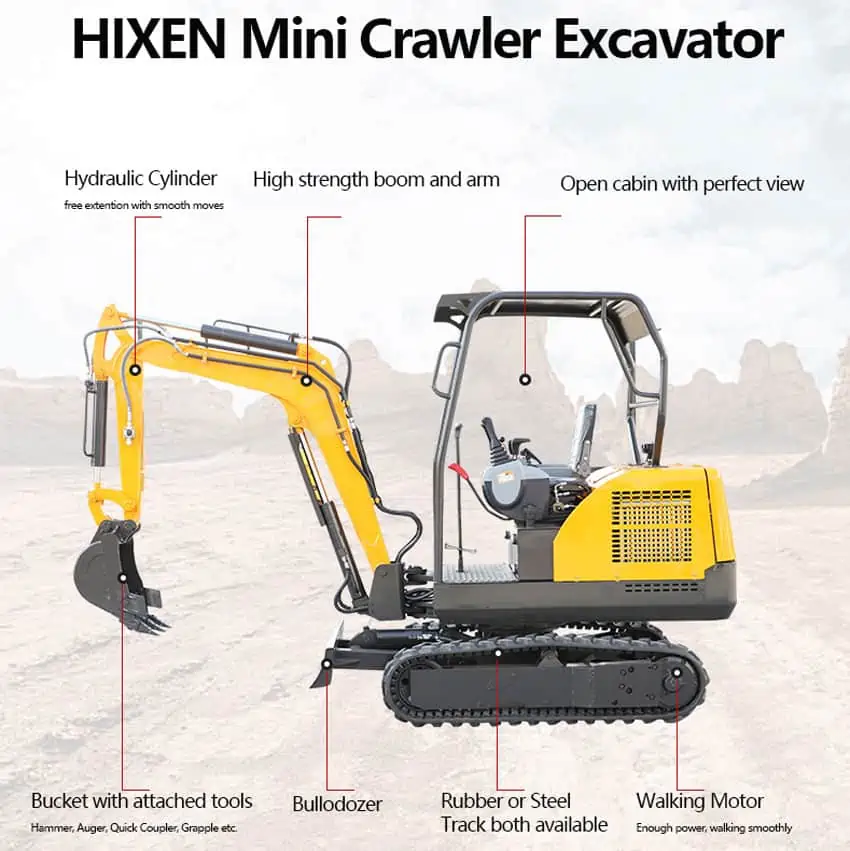
A mini excavator can be fitted with many types of attachments to do all sorts of work in the construction project. Some of the attachments used in mini excavators are:
✔Rippers
✔Rakes
✔Hamers
✔Thumbs etc.
✔Augers
✔Grapples
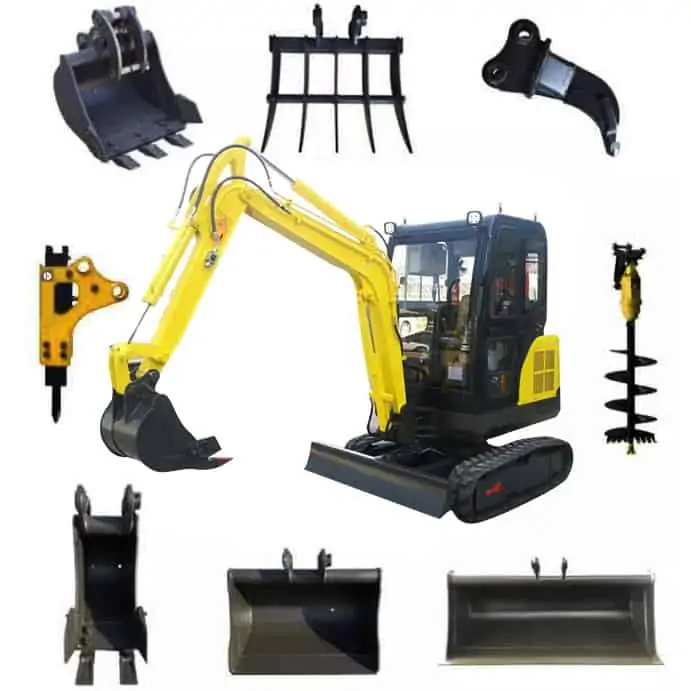
Mini Excavators are used for light material handling, construction projects, stump removal, landscaping, etc. Mini excavators are used in small projects in landscaping and construction. Some of the jobs performed by mini excavators are:
✔Installing pools and hot tubs
✔Repairing sewer lines
✔Grave digging
✔Landscaping projects
✔General digging projects
✔Tree harvesting
✔Home Renovations
✔Roadside applications
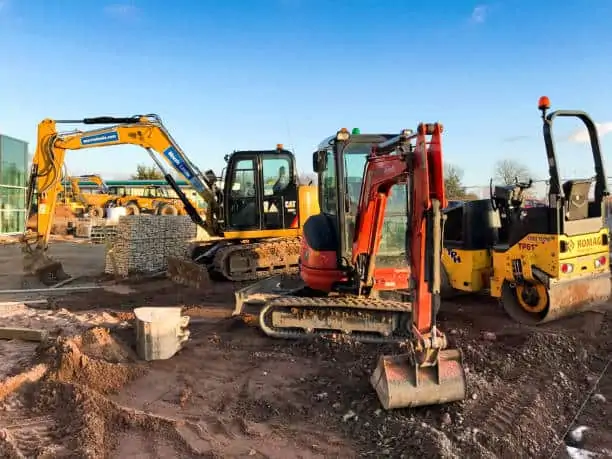
Midi Excavators
Midi excavators are mid-size excavators. They have the same lifting and digging capacities as their larger alternatives. Midi excavators have features of mini excavators such as compact design, rubber tracks, and minimum/near zero swing radius. They are used in building construction, bridges, roads and landscaping,
Midi excavators weigh between 10000 pounds which is equivalent to 4536 kg to19,999 pounds which is equivalent to 9071 kg. It has varying stick lengths according to boom for example offset, two-piece, swing away or variable angle.
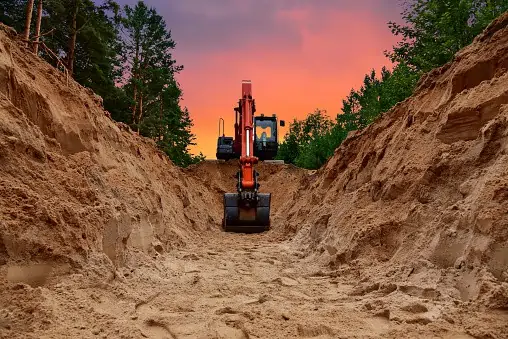
Mid-sized or Midi excavators are a good choice if you need to work in small spaces. Midi excavators have more reach power than mini excavators. These can be used on more standard projects like landscaping and construction. The maneuverability of midi excavators is higher because of their small size.
Mid excavators are mostly used in building construction, roads, utilities, and landscaping. Some models of midi excavators are zero or near zero swing radius while other models have a conventional tail design.
Midi machine provides lifting and digging capabilities more in line with their counterparts of full size. They are compact enough to provide advantages in Jobsite access and transportation. Midi can handle a variety of backyard jobs for example if you want to shape the surface or dig a hole.
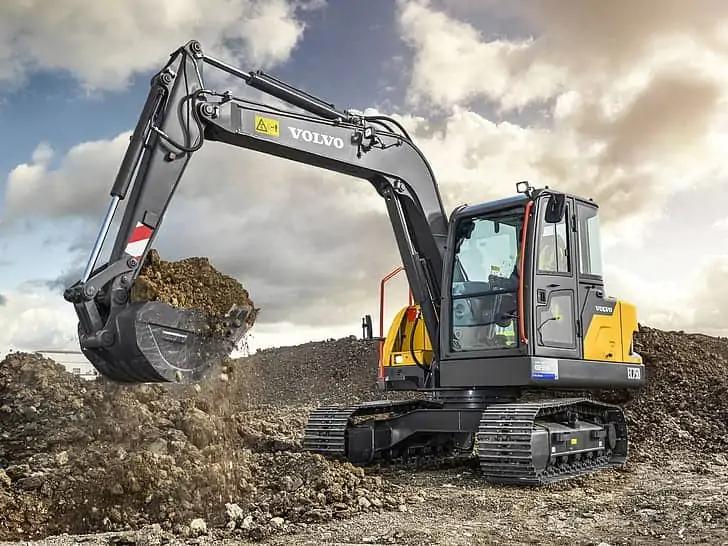
Midi excavators are used in small to medium-sized projects. With full-sized diggers, the midi excavator provides great assistance where precision and accessibility are needed. Some of the uses of midi excavators are
✔Drainage and utility surfaces
✔Shaping ground surfaces
✔Demolishing concrete, steel, asphalt, and other constructions materials but on a smaller scale
✔Removing tree stumps
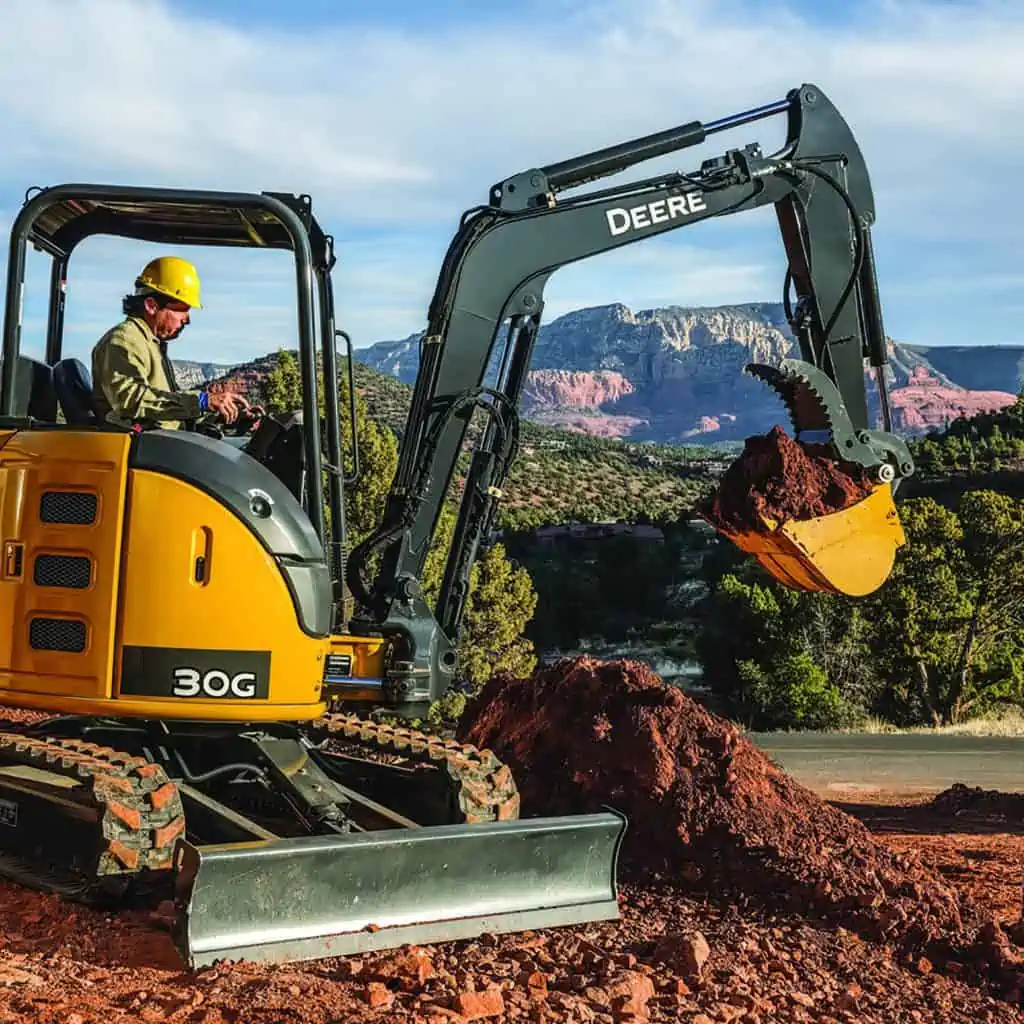
Zero Tail Mini Excavator
In a zero-tail-swing excavator, the upper body of the excavator does not extend beyond the width of the undercarriage when rotating like a conventional tail swing. The Excavator house does not extend more than a few inches using a reduced tail swing. These excavators are easy to use and due to their small size chance of collisions with obstructions or buildings is reduced.
Zero tail mini excavators can work in congested areas. It can easily be directed and move with very little chance of damaging buildings, the machine itself, and other obstructions. These types of excavators have more pitch than any traditional machine by applying loads or attachments. These excavators are perfect for demolition projects.
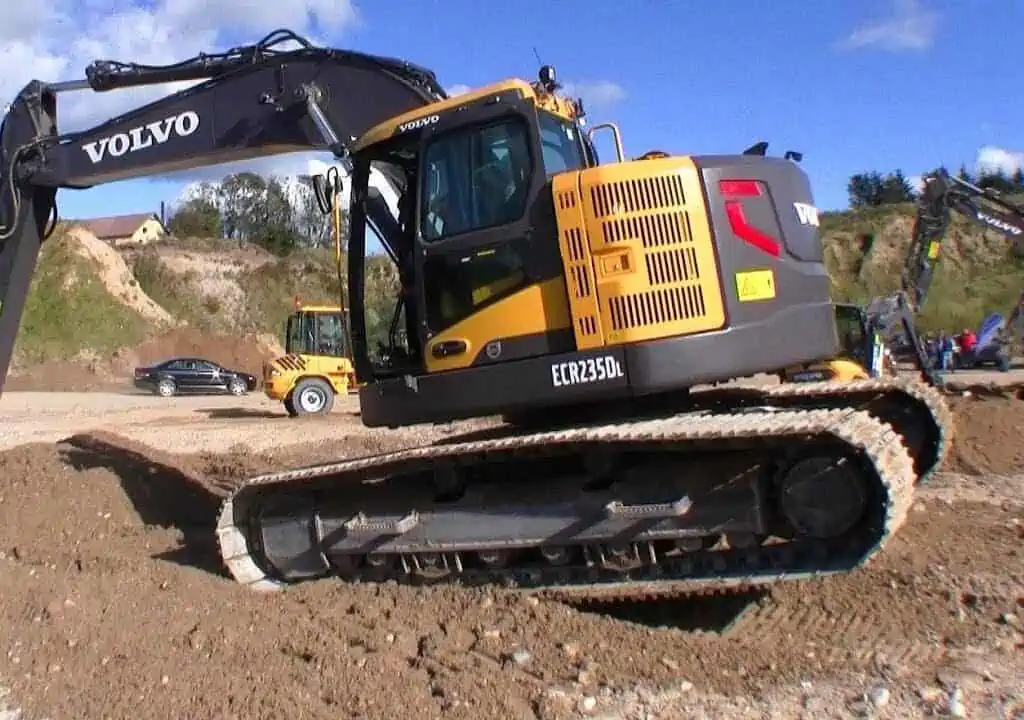
Zero tail excavators can easily remove snow from the roads compared to conventional tail swing excavators. These are basically used where space is confined. For better performance and comfort it is important to match the correct attachment size or weight.
So you have to perform a proper equipment search to get the right heavy equipment with the right operating weight.
Some of the benefits of a zero tail swing excavator
- To easily fit in small, confined spaces for example gap between a fence and a house is the biggest and obvious benefit of a zero tail swing excavator
- In construction sites where the area is small for conventional tail swing excavators but the project is large, a zero tail swing excavator is used.
- Versatility is also another big advantage for zero-tail swing mini excavators. Other than zero swings these excavators can do many types of jobs just like their larger counterparts using the same heavy attachments.
- There is no problem in handling popular models whether you are in tight spaces or open spaces. They can be easily transported.
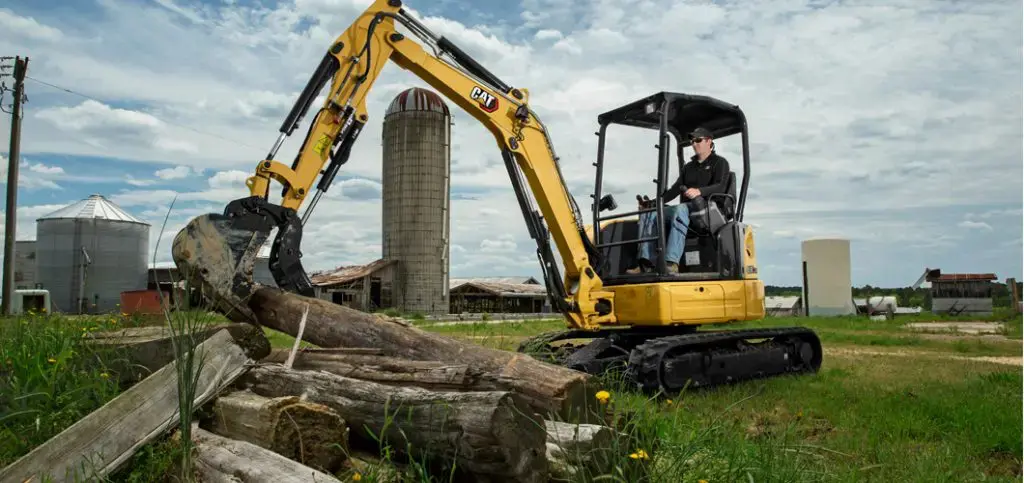
Disadvantages of zero tail swing excavator
- Size is the most noticeable disadvantage of zero-tail swing excavators. It will take more time in digging compared to traditional excavators.
- When performing a large-scale job through zero tail excavators, will hold you back as compared to traditional excavators.
- Less lifting capacity & less power.
Wheeled Excavator
An excavator that has wheels instead of tracks in its undercarriage is called a wheeled excavator. These types of excavators are highly flexible. They can work on the road as well as off-road. These are just as productive and powerful as tracked excavators.
A wheeled excavator provides versatility which allows you to change attachments according to the type of job. Due to wheels, it can travel at high speed. The wheeled excavator has low emissions hence environmentally friendly as compared to track excavators. These types of excavators have fuel-efficient engines
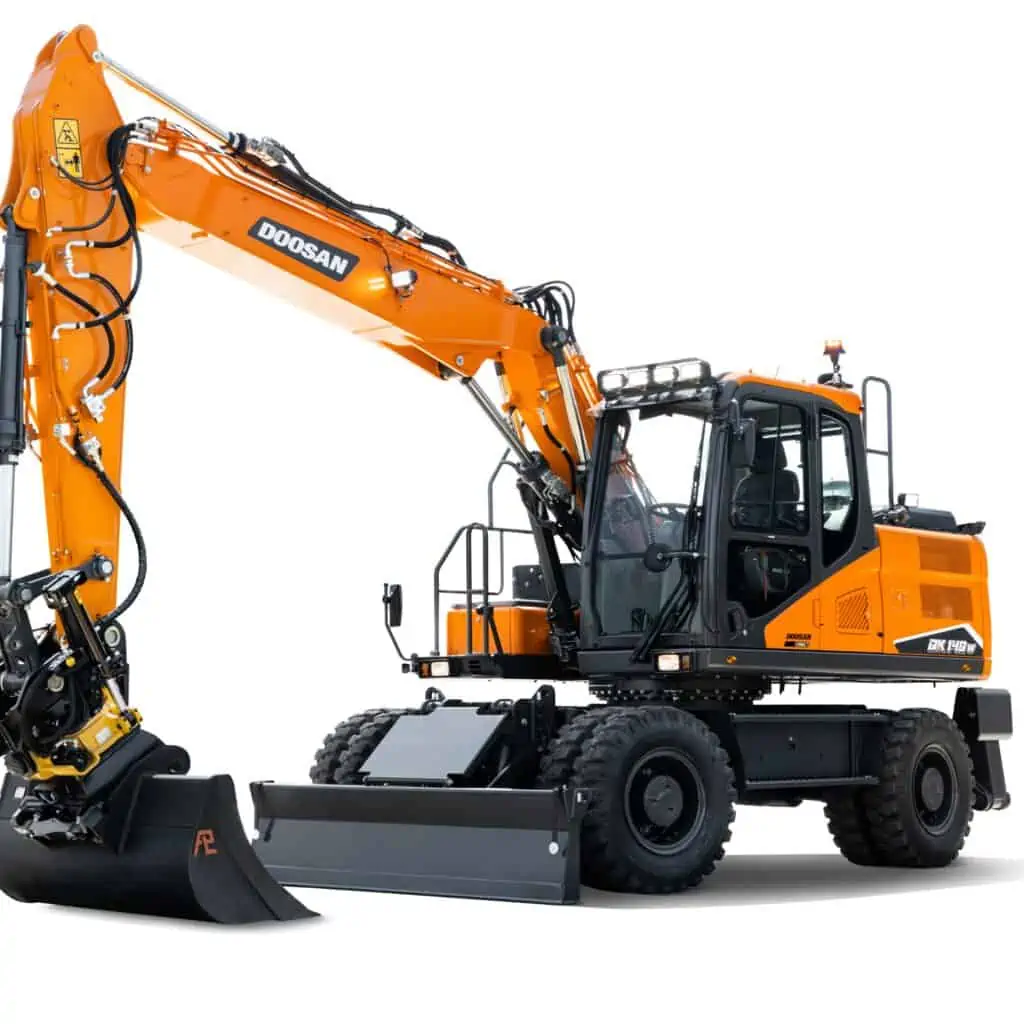
Benefits Of Wheeled Excavator
- Cost-efficient
- Travel speed is high enough that a carrier is not needed if the distance is short.
- Unlike tracked excavators, wheeled excavators do not damage the top layer of ground for example asphalt.
- These can work in scrapyard work, road work, utility installation, and waste handling.
Disadvantages of the wheeled excavator
- The stability of wheeled excavators is less compared to tracked excavators. Using outriggers it became just as stable as a tracked excavator. But still, more care is needed on slopes
- The Center of gravity is higher in wheeled excavators because of the wheel’s height hence reducing stability.
- Digging depth is less because of wheels (HEIGHT OF WHEELS) as compared to tracked excavators
- Wheeled excavators are more expensive than tracked excavators. If maintenance is not included
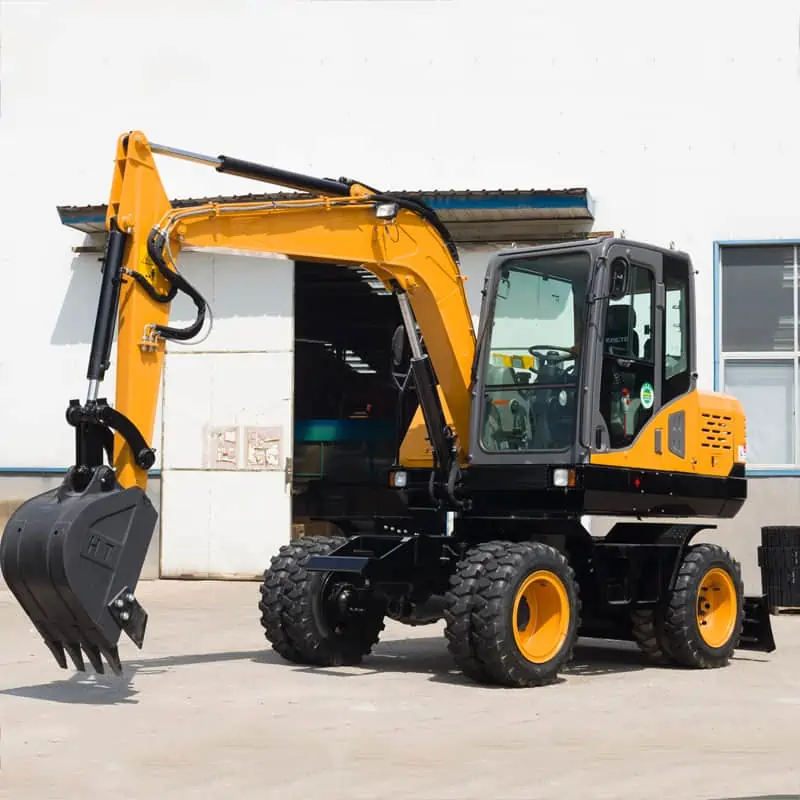
Backhoe Excavator
The backhoe excavator contains two main parts; a tractor which is located between a loader at the head of the machine and a backhoe at the back of the machine. These are often confused with excavators as both are used for digging and both of them have articulated boom and bucket in the end. Unlike backhoes, excavators do not have a loader in the fore part.
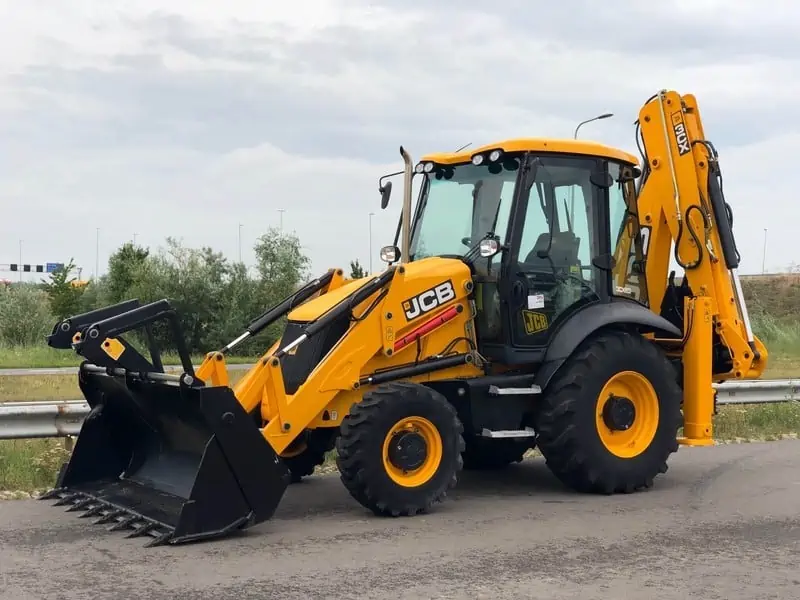
Backhoe consists of these components
- The tractor operates the loader
- Front loader plow construction materials
- The backhoe supports the bucket
- Stabilizer legs stabilize the legs
- The cab is where the operator operates
- A bucket is used to dig holes in the ground
The digging depth of your backhoe depends upon the size of the machine. Large models can dig up to 14 feet down however compact backhoes have a digging capacity of 6 to 8 feet. Backhoes can lift weights between 5500 and 8200 pounds having a bucket size between 12 to 36 inches
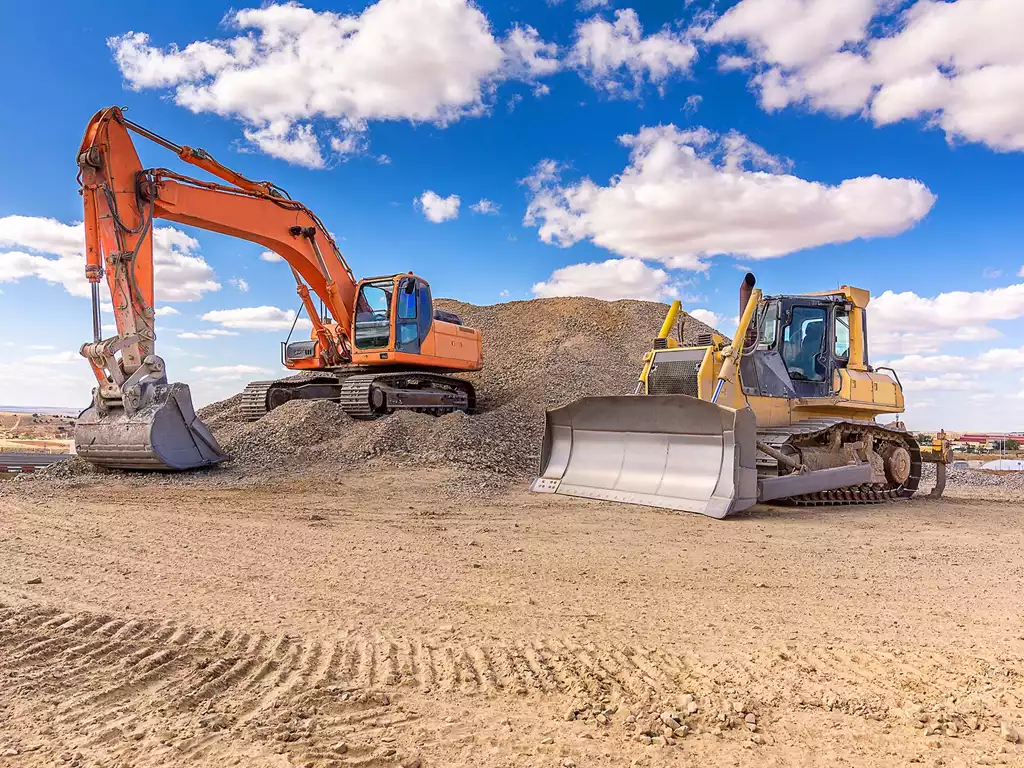
Conclusion
We HIXEN is one of the excavator manufacturers of excavators based in China. The product quality has been proved by the market with affordable price. Mainly we offer these 5 types of excavators as mentiond above. Are you looking to purchase the right type of excavator? Contact Us now to get your quote.
